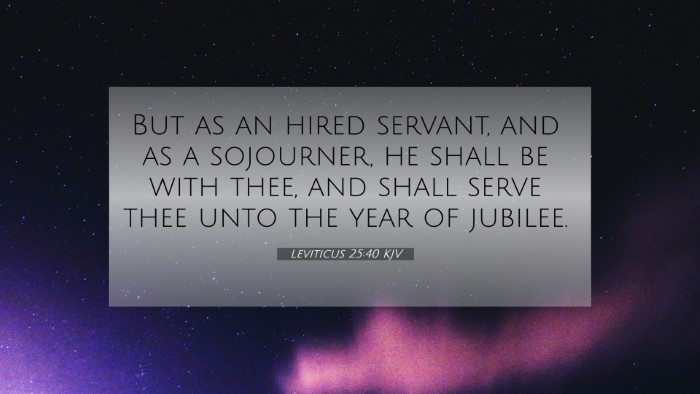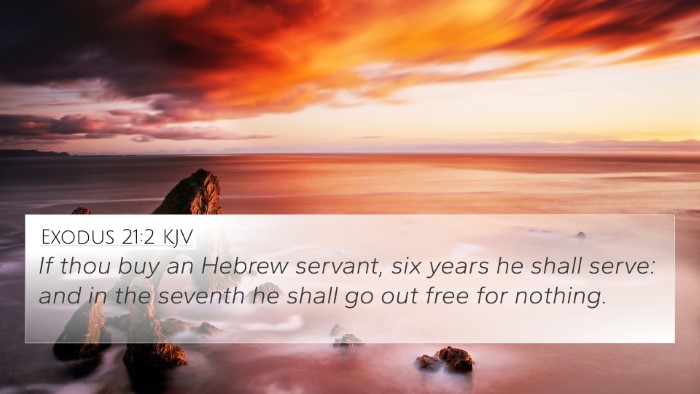Understanding Leviticus 25:40
Leviticus 25:40 states: "But as a hired servant and as a sojourner he shall be with you, and shall serve you until the year of jubilee." This verse appears within the context of laws related to land, property, and servitude during the ancient Israelites’ agricultural society. The insights derived from this verse are essential for understanding social justice, economic fairness, and the equality before God that the Law intended to promote.
Insights from Public Domain Commentaries
Numerous commentaries shed light on the implications of this verse, providing a rich theological and practical understanding:
- Matthew Henry's Commentary: Henry emphasizes that the laws governing servitude reflect God's concern for the dignity of every individual. He notes that hired servants are not to be treated as mere property but rather with respect, and emphasizes the importance of humane treatment throughout their service.
- Albert Barnes' Notes: Barnes points out how this verse underscores the necessity of compassion in economic dealings. He interprets the "year of jubilee" as a divine reset, where every servant would be freed, thereby preventing perpetual servitude, which could lead to societal inequity.
- Adam Clarke's Commentary: Clarke highlights the spiritual imagery here, suggesting that, much like the hired servant, believers are to live under the guidance of God’s commandments while acknowledging their temporary status in this world. The idea of the jubilee can be seen as a foreshadowing of ultimate redemption.
Key Themes and Connections
The context of Leviticus 25:40 includes themes of:
- Social Justice: It reflects on the treatment of individuals within society, advocating for their rights and dignity.
- Restoration: The concept of jubilee promotes restoration and freedom, preventing long-term inequalities.
- Temporary Status: The idea that all individuals are sojourners in this life, underlining a biblical perspective of humility and dependence on God's grace.
Cross-References and Thematic Links
Leviticus 25:40 resonates with various other Bible verses, establishing a deeper understanding of biblical themes. Here are some significant cross-references:
- Exodus 21:2: Discusses the treatment of Hebrew servants, emphasizing their eventual release.
- Deuteronomy 15:12-15: Further elaborates on the concept of liberating servants and reminding the people of their own slavery in Egypt.
- Isaiah 61:1: Proclaims the year of the Lord's favor, linking to the concept of jubilee and freedom.
- Luke 4:18-19: Jesus quotes Isaiah, reflecting the fulfillment of the jubilee's promise of freedom.
- Galatians 5:1: Encourages believers to stand firm and not be burdened again by a yoke of slavery, paralleling themes of liberation.
- Matthew 20:26-28: This calls for servant leadership, emphasizing humility and service among leaders.
- 1 Timothy 6:1-2: Addresses the treatment of servants and encourages respect and equity.
Conclusion and Summary Insights
Leviticus 25:40 teaches crucial lessons about humanity, justice, and the overarching theme of redemption throughout the Scriptures. The connections between Bible verses amplify these themes, making this verse a cornerstone for understanding economic justice and ethical treatment of individuals in our society.
Through tools for Bible cross-referencing, believers can explore the intricate web of connections that the Scriptures provide, leading to a richer understanding of God's intention for humanity across both the Old and New Testaments. This passage encourages readers to think critically about their roles in society and their responsibilities towards one another.
Further Study and Resources
For those interested in delving deeper into Bible verses that relate to Leviticus 25:40, consider using a Bible concordance or a Bible cross-reference guide as tools for cross-referencing. This will help you identify connections and thematic elements throughout the Bible. Methods such as cross-referencing Bible study can bring clarity and insight into how these verses interrelate.



